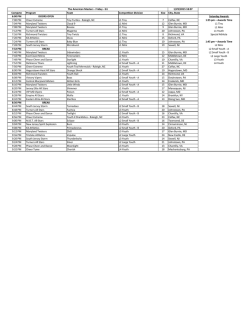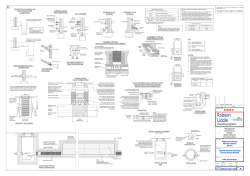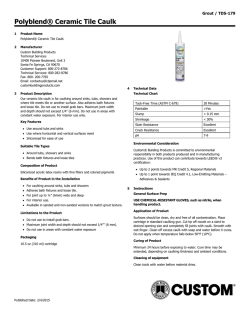
Tiny Tub Challenge Guide
The Tiny Tub Two Worm Challenge The 'What-You-Need-To-Know' Guide Bentley “Compost Guy” Christie http://www.RedWormComposting.com OVERVIEW At the beginning of January (2015), I came up with (what I think is) a fun worm-growing project idea. A project that anyone can take part in. This guide is intended to provide all the information needed to get started. Since a lot of questions have been coming in about the specifics of the challenge, I decided to use a Q&A format. THE BASICS “What is the Tiny Tub Two Worm Challenge (TTTWC)”? For a long time I've wanted to start a project that measures population growth in composting worms. I will be looking specifically at Red Worms and Euros – but I definitely welcome info on other varieties as well. “So how does this work?” Each participant simply starts up some “tiny tubs” (see next section for specifics), each containing two immature worms of a particular species (do not mix species). Once the worms become adults (visible clitellum) rates of reproduction and overall population growth are monitored. “How do I 'sign up' for this project?” There is no official “sign up”. Early on I had the “brilliant” (sarcasm) idea to make everyone email with their info etc etc...but I quickly (thankfully) realized this didn't make any sense. What makes a LOT more sense is to provide all the important info here (in the guide), to create an email list (sign up here: http://forms.aweber.com/form/18/1205546418.htm), and to simply request that everyone keep their own notes and stay in touch (especially when I ask for results). “When is it 'too late' to join?” It is never too late to join. As long as you follow the (basic) instructions, you can start whenever you want. I myself plan to start different trials at different times. The key is really just to stick to the basic idea, make (and record) lots of notes/observations about what you're doing and share your various key bits of data along the way. http://www.RedWormComposting.com GETTING STARTED “What size of tubs should I use?” I am using small cottage cheese / sour cream type tubs. They are about 500 ml (2 cups; 16.9 oz; ~ 0.5 quart) in size. You CAN use larger tubs (and I'd actually be interested to see what effect habitat size has on population growth), but realize that it will definitely take you more time to do your worm/cocoon counts later on. “How many tubs per trial?” Again, this is really up to you – but my recommendation would be 3 or 4 small tubs per trial. This will provide a more accurate picture (than 1 or 2 tubs), but will still be manageable. Similar to the tub size, you need to be careful not to bite off more than you can chew. It might seem “fun” to set up 10 tubs, or a bunch of different trials (to test different things) – but remember that there will be much more of a time commitment, especially further down the line. “How do I prepare the tubs for the worms?” Fill the tub most of the way with moistened (but not sopping wet) bedding. Something bulky like shredded cardboard will work best since you'll have a much easier time finding worms and cocoons. It's also a great material for keeping the system oxygenated (since it allows more air flow). Speaking of air flow, make sure you add air holes in the lid and/or sides of tub (keep them consistent from one tub to the next). This assumes of course that you are using plastic enclosed tubs (recommended). Mix in a relatively small amount of mixed food waste – ideally a mix you can keep fairly consistent between tubs in the sale trial. You should have at least 3X more bedding than food. Ideally, you should let the bins age for at least a few days before adding the worms – but this is NOT vitally important (I didn't even do this myself) http://www.RedWormComposting.com “Why do we have to use juveniles?” Composting worms can remain fertilized for quite a while and will continue to drop cocoons as long as they can. So if you add mature worms to your tubs it is very likely they will just start dropping cocoons right away. Obviously this will throw off the results, since we're trying to measure population growth starting from only two worms (all reproduction needs to be between these two worms). NOTE: Certain kinds of worms, such as Blue Worms (Perionyx excavatus) are known to selffertilize sometimes, and there MAY even be a chance of Red Worms doing this (jury is still out), so I encourage some of you to try out separate “One Worm Challenges” as well. The results could be pretty fascinating! “How can I tell if my worms are juveniles?” I use the clitellum (thickened band up near head region) as the go-to feature, but relying solely on its presence/absence can be lead you astray. Sometimes mature worms don't have an obvious clitellum – so my other recommendation is to ONLY start with worms that are very small. “Where should I keep the tubs?” Ideally, these tubs should be kept somewhere indoors, or at least a location where temperatures remain pretty steady. It doesn't necessarily need to be “warm” (I'll actually be really interested to see how population growth is affected by cool temps), but it will be easiest to draw meaningful conclusions from the data if temperature is a variable held reasonably constant. Don't let this stop you from participating though! Just make sure you include the typical temperature range in your notes/ ONGOING “What observations/measurements should I make?” Temperature (even if you don't have a thermometer, do your best to come up with an estimate) Cocoon/worm counts – simply keep track of how many worms and cocoons are in each tub. http://www.RedWormComposting.com Feeding – what foods are added, and how often. You CAN record actual quantity if you want (that would be ideal) but I myself will likely just be aiming for keeping the worms “well fed”, so that food supply doesn't ever end up being a limiting factor. Miscellaneous – really, just make observations re: ANY changes to the systems. What organisms are you seeing? How often are you adding more bedding? There's no such thing as “too many” observations. Really, the more detailed you are, the better – BUT remember to honor your time as well. Don't burn yourself out – better to record the bare minimum stuff and keep going than be ridiculously detailed but stop after a month. “Where should they be recorded? This is up to you. I am using a small notebook, but maybe you'll prefer typing them directly into a computer/tablet etc. Whatever works best for you! “How often do I record observations?” Ideally, once the worms are mature you should make observations about once per week. More often would be great (no pressure though), but if you leave things longer than this you may miss out on important milestones (first cocoon, first hatchling etc), and just generally won't be in touch with the “needs” of the system (more food/bedding etc). If your goal is simply to test growth in a totally passive system, then this isn't as big a deal...and again, if it is a matter of participating or not participating, don't worry about it!! As always, just make sure you keep a full record of all your observation sessions. “Do I need to send my info in? If so, how often?” As touched on earlier, I originally thought it would make sense to have everyone let me know when they had started up their Tiny Tub trial(s), and to provide me with preliminary set-up info. I quickly realized how silly this idea was (since it would take up tons of time needlessly). Obviously it makes way more sense to simply let everyone do their own thing (using the guidelines presented here), and to periodically touch base at particular check points. http://www.RedWormComposting.com RESOURCES TTTWC Email list: http://forms.aweber.com/form/18/1205546418.htm I will provide ongoing updates via the email list, so if you are participating in the challenge I HIGHLY recommend you get fully signed up for the list (don't forget that pesky confirmation link in the first email you receive!) Original TTTWC Blog post: http://www.redwormcomposting.com/fun-stuff/the-tiny-tub-two-worm-challenge/ (for reference only - just remember that the info in this guide is the most current) QUESTIONS? Just email me here: http://www.redwormcomposting.com/contact-us/ (and make sure to mention “Tiny Tub” or “TTTWC” in subject line) http://www.RedWormComposting.com
© Copyright 2026




